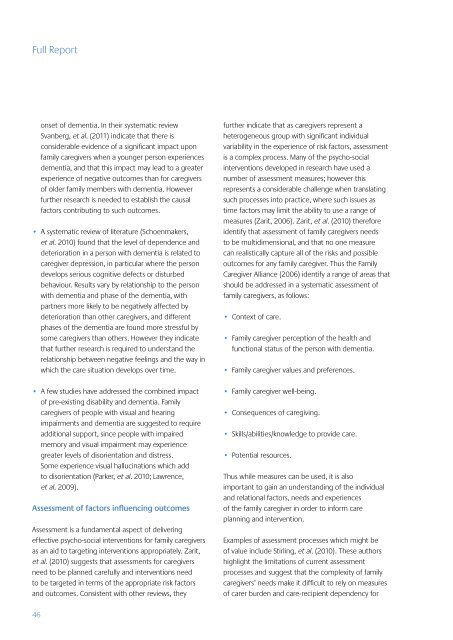The experiences needs and outcomes for carers of people with dementia
RSAS-ADS-Experiences-needs-outcomes-for-carers-of-people-with-dementia-Lit-review-2016
RSAS-ADS-Experiences-needs-outcomes-for-carers-of-people-with-dementia-Lit-review-2016
Create successful ePaper yourself
Turn your PDF publications into a flip-book with our unique Google optimized e-Paper software.
Full Report<br />
onset <strong>of</strong> <strong>dementia</strong>. In their systematic review<br />
Svanberg, et al. (2011) indicate that there is<br />
considerable evidence <strong>of</strong> a significant impact upon<br />
family caregivers when a younger person <strong>experiences</strong><br />
<strong>dementia</strong>, <strong>and</strong> that this impact may lead to a greater<br />
experience <strong>of</strong> negative <strong>outcomes</strong> than <strong>for</strong> caregivers<br />
<strong>of</strong> older family members <strong>with</strong> <strong>dementia</strong>. However<br />
further research is needed to establish the causal<br />
factors contributing to such <strong>outcomes</strong>.<br />
• A systematic review <strong>of</strong> literature (Schoenmakers,<br />
et al. 2010) found that the level <strong>of</strong> dependence <strong>and</strong><br />
deterioration in a person <strong>with</strong> <strong>dementia</strong> is related to<br />
caregiver depression, in particular where the person<br />
develops serious cognitive defects or disturbed<br />
behaviour. Results vary by relationship to the person<br />
<strong>with</strong> <strong>dementia</strong> <strong>and</strong> phase <strong>of</strong> the <strong>dementia</strong>, <strong>with</strong><br />
partners more likely to be negatively affected by<br />
deterioration than other caregivers, <strong>and</strong> different<br />
phases <strong>of</strong> the <strong>dementia</strong> are found more stressful by<br />
some caregivers than others. However they indicate<br />
that further research is required to underst<strong>and</strong> the<br />
relationship between negative feelings <strong>and</strong> the way in<br />
which the care situation develops over time.<br />
• A few studies have addressed the combined impact<br />
<strong>of</strong> pre-existing disability <strong>and</strong> <strong>dementia</strong>. Family<br />
caregivers <strong>of</strong> <strong>people</strong> <strong>with</strong> visual <strong>and</strong> hearing<br />
impairments <strong>and</strong> <strong>dementia</strong> are suggested to require<br />
additional support, since <strong>people</strong> <strong>with</strong> impaired<br />
memory <strong>and</strong> visual impairment may experience<br />
greater levels <strong>of</strong> disorientation <strong>and</strong> distress.<br />
Some experience visual hallucinations which add<br />
to disorientation (Parker, et al. 2010; Lawrence,<br />
et al. 2009).<br />
Assessment <strong>of</strong> factors influencing <strong>outcomes</strong><br />
Assessment is a fundamental aspect <strong>of</strong> delivering<br />
effective psycho-social interventions <strong>for</strong> family caregivers<br />
as an aid to targeting interventions appropriately. Zarit,<br />
et al. (2010) suggests that assessments <strong>for</strong> caregivers<br />
need to be planned carefully <strong>and</strong> interventions need<br />
to be targeted in terms <strong>of</strong> the appropriate risk factors<br />
<strong>and</strong> <strong>outcomes</strong>. Consistent <strong>with</strong> other reviews, they<br />
further indicate that as caregivers represent a<br />
heterogeneous group <strong>with</strong> significant individual<br />
variability in the experience <strong>of</strong> risk factors, assessment<br />
is a complex process. Many <strong>of</strong> the psycho-social<br />
interventions developed in research have used a<br />
number <strong>of</strong> assessment measures; however this<br />
represents a considerable challenge when translating<br />
such processes into practice, where such issues as<br />
time factors may limit the ability to use a range <strong>of</strong><br />
measures (Zarit, 2006). Zarit, et al. (2010) there<strong>for</strong>e<br />
identify that assessment <strong>of</strong> family caregivers <strong>needs</strong><br />
to be multidimensional, <strong>and</strong> that no one measure<br />
can realistically capture all <strong>of</strong> the risks <strong>and</strong> possible<br />
<strong>outcomes</strong> <strong>for</strong> any family caregiver. Thus the Family<br />
Caregiver Alliance (2006) identify a range <strong>of</strong> areas that<br />
should be addressed in a systematic assessment <strong>of</strong><br />
family caregivers, as follows:<br />
• Context <strong>of</strong> care.<br />
• Family caregiver perception <strong>of</strong> the health <strong>and</strong><br />
functional status <strong>of</strong> the person <strong>with</strong> <strong>dementia</strong>.<br />
• Family caregiver values <strong>and</strong> preferences.<br />
• Family caregiver well-being.<br />
• Consequences <strong>of</strong> caregiving.<br />
• Skills/abilities/knowledge to provide care.<br />
• Potential resources.<br />
Thus while measures can be used, it is also<br />
important to gain an underst<strong>and</strong>ing <strong>of</strong> the individual<br />
<strong>and</strong> relational factors, <strong>needs</strong> <strong>and</strong> <strong>experiences</strong><br />
<strong>of</strong> the family caregiver in order to in<strong>for</strong>m care<br />
planning <strong>and</strong> intervention.<br />
Examples <strong>of</strong> assessment processes which might be<br />
<strong>of</strong> value include Stirling, et al. (2010). <strong>The</strong>se authors<br />
highlight the limitations <strong>of</strong> current assessment<br />
processes <strong>and</strong> suggest that the complexity <strong>of</strong> family<br />
caregivers’ <strong>needs</strong> make it difficult to rely on measures<br />
<strong>of</strong> carer burden <strong>and</strong> care-recipient dependency <strong>for</strong><br />
46


